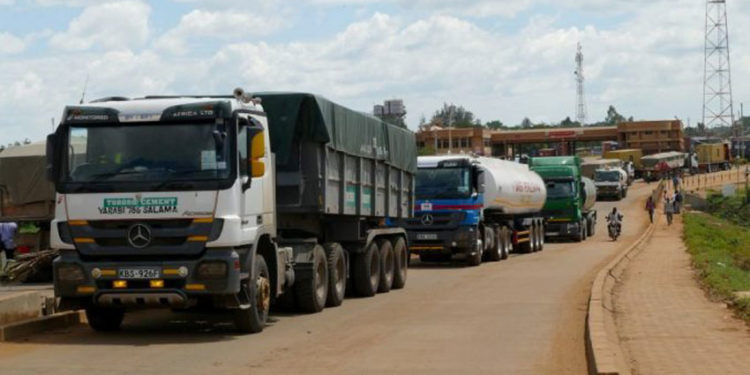Kenyan truck drivers have said that they will not be transporting goods to Uganda following the rampant discrimination by Ugandan authorities and the local people.
Sources from Kenya allege that truck drivers are protesting against what they term as “harassment and discrimination” by Ugandan authorities at the Malaba and Busia border points. The two points have been severely affected by massive delays ever since the outbreak of Covid-19 in March.
According to Martin Mwita Kenyan business journalist, truck drivers’ protest follows the call by the Secretary-General of Kenya Long Distance Truck Drivers Association, Nicholas Mbugua who asked all Kenyan drivers to stop going into Uganda until the top authorities in Uganda intervene.
Mbugua’s arguments that prompted him to call for the boycott was, due to reports that when Kenyans truck drivers enter into Uganda, they are denied access to basic needs such as food, water, and accommodation which has made their lives difficult thus affecting the smooth transit and deliver cargo.
He added that Kenyan drivers are perceived as carriers of coronavirus even after testing negative and allowed to move.
“Our drivers are being harassed so what I am saying is, stop going into Uganda. Let them come for their own cargo. Who said Ugandans cannot have the virus? We are going to stop going into Uganda until the two governments agree on how to address these issues,” said Mbugua.
The strike comes at a time when Logistics firm-Kobo360 had just confirmed that clearance for its clients’ consignments has dropped almost half due to deployments at the border points.
“The mandatory coronavirus testing at the Kenya-Uganda border has reduced clearance for Kobo360 truck drivers of essential goods to less than 50 per cent,” said Dennis Koome the Country Manager in Kenya.
As per now, there are over 600-1000 heavy commercial trucks that use the Northern Corridor which links almost fives countries to Mombasa Port. Such countries include; Uganda, Rwanda, Burundi, South Sudan and the Democratic Republic of Congo.
Uganda takes the biggest percentage (83.2 per cent) of the cargos that transit through the Mombasa Port, followed by South Sudan with 9.9 per cent, DRC 7.2 per cent, Tanzania 3.2 per cent and Rwanda 2.4 per cent.
Business experts have cautioned that if the truck drivers stop operating even for one week, it will cause huge damage on imports and exports in and out of the hinterland because cargos are going to pile at the port hence causing losses to the businessmen who already paid their bills for cargos to be transported to Uganda.
PR Account Executive for Kobo360 Towsyn Omowole says truck drivers are currently experiencing additional fuel expenses, increased mileage per trip and even truck and cargo security, which have caused an escalation in the drivers monthly costs. Lengthy Turn Around Times (TAT) is also leading to financial pressure on truck drivers, some of which are defaulting on loans.
This is likely to cause a sharp increase in the cost of transporting import and export. Currently, it costs an average $2,100 (about Shs 7,986,750) to move a 20-foot container from Mombasa to Kampala, however, there speculations that it may go higher if the strike goes on.
Last week the CEOs of national private sector associations in East Africa held an online meeting to evaluate the status of the transport and logistics sector in light of the outbreak of Covid-19 in the EAC region and they called for rapid testing and joint border management.
Their aim was to build confidence and fast track movement of goods in the borders. However, the continuous delay of the trucks at Kenya-Uganda border Malaba and Busia shows that the call has not been put in practice.
Do you have a story in your community or an opinion to share with us: Email us at editorial@watchdoguganda.com









